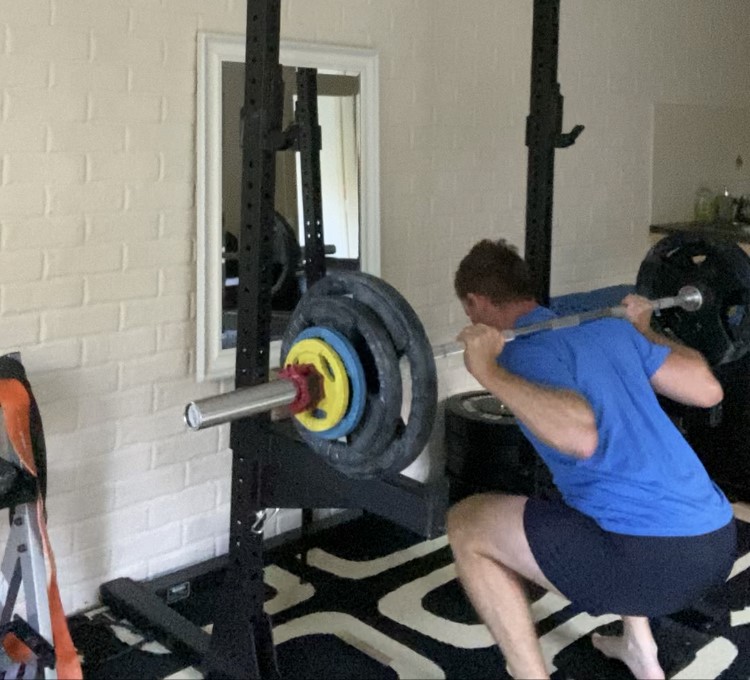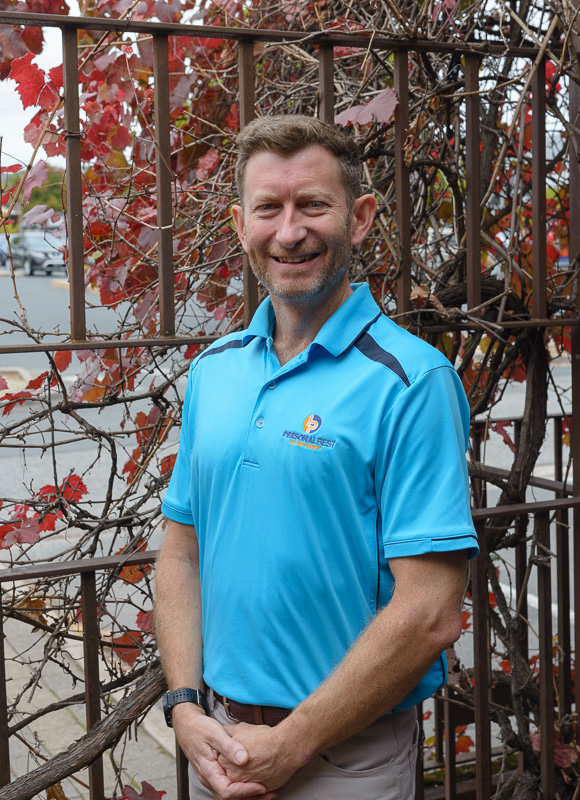Over the past 9 months I have been regularly training using a barbell and weights, focusing on increasing my strength in a few compound lifts. For those who aren’t familiar with strength training lingo, compound lifts are those that involve moving several joints at once – they recruit the largest amount of muscle, produce the greatest amount of force and make you tired if you do them well! Examples of compound lifts include Squats with a loaded bar across the back (see photo), Deadlifts, Bench Press and Overhead Press.
Nine months on and I have signed up for online coaching, where I video the last set of each exercise in my workout (which is the one in which I am the most tired), send it off to my coach who then provides feedback and adjusts my program if needed. I have made reasonable progress (not outstanding) and the journey has seen some hiccups along the way.
What has this got to do with you as a patient?
A lot.
Getting stronger doesn’t happen overnight and, as a physiotherapist of 20 years, I see many parallels between my journey so far and that of my patients recovering from a lower back, shoulder, hip or knee problem. Here’s what we have in common:
- Your physio is your coach: When I have got “stuck” with one of my lifts (I cannot complete what is set out or I fail to make progress over several sessions) I look to my coach for guidance. I trust that she has done this with many other people and that her knowledge and experience is the best place to start a discussion and problem solving process. I don’t change coaches just because I got stuck, and yet I see many patients changing health providers when they aren’t better after 2-3 visits. Find someone you trust and work with them to tackle setbacks and stalls. You are much more likely to get better working with one health professional who you trust and can talk to openly and honestly than switching health providers every time you have a setback.
- Follow a plan until it no longer works: If, nine months ago, I were to show up to the gym and do whatever I felt like on the day, I wouldn’t have got very far. I needed a plan – ideally one that has worked for lots of other people, that way I know that it is at least likely to work for me. Following in someone else’s (successful) footsteps is a great place to start and this is what your physio should do – give you a plan that has worked for many other patients just like you. Your job is to follow it carefully until it stops working – that’s your first “decision point” where, together with your physio, you both need to work out what the next best step is.
- Change one variable at a time: Let’s say I am following my strength program, it works for a while, but then I seem to stall, what change should I make? A good rule to follow here is “minimum effective change” which means changing one variable only to see if we can get you improving again. As an example, when I was no longer able to progress my deadlift every session by doing one hard set of 5 reps my coach changed it to two hard sets of 3 reps. I could continue adding a little weight to the bar but I was in no danger of failing a set and my form stayed good. Changing one variable at a time often results in patients being able to continue making progress and is the most logical, scientific way of solving problems.
- Pay attention! In order to get stronger, I am following a training program that is structured and progressive. I know exactly what I am supposed to be doing each session and you should know exactly what your home exercise program is. I also need to make sure I get 8 hours of sleep a night and eat appropriately for the training I am doing. If you are unclear on your home exercise program, aren’t sleeping because of pain or your skip meals and don’t have any fresh fruit and vegetables in your diet then you’re not going to get better as quickly as someone who pays attention to these things. In short, take your recovery seriously and pay attention to things that are likely to produce the greatest “bang for buck” – you will get better quicker and back to the activities that are meaningful to you.
At Personal Best Physiotherapy we love working with our patients to help them get better. We use the above principles of coaching, developing a plan and changing one variable at a time to solve tricky problems of the lower back, hip, knee and shoulder. If you’re looking for a great physio to help you through a difficult time, call us on 6056 6616 – our front desk team will help you find a day and time that works for you to come in for an initial appointment, meet one of our physio’s and start taking the first steps towards feeling better.






